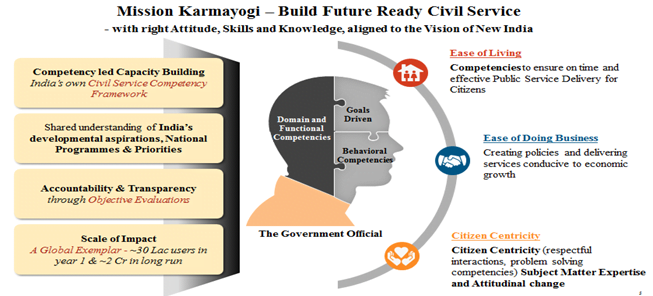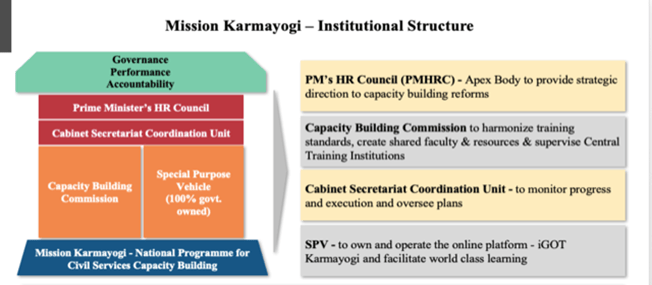Governance
Context: The civil services have remained at the epicentre of all government activities in India, both as agents of policymaking as well as the executive hand that delivers and implements those policies
- Therefore, this unique moment of Amrit Mahotsav is the appropriate time for the civil services to pause, reflect and strategize on the approaches needed to shape its future. People-centric governance is no longer aspirational but is rapidly becoming the national imperative.
Evolution of the Indian state: from being a provider and a provisioner state, to becoming a “partnership state:
- These forces have led to a sharper focus on citizen-centricity, engagement and partnership, which the Prime Minister has aptly called Jan Bhagidari.
- These forces herald a new phase in the evolution of the Indian state — from being a provider and a provisioner state, to becoming a “partnership state”.
- As we observed during the time of covid-19 pandemic that different arms of the national government acts as partnership state, from the PMO to the Ministry of Health and Family Welfare and many other ministries, the NITI Aayog, ICMR and other central government organisations.
- These arms collaborated effectively with international bodies and state governments, bringing out the strength of India’s global relations and federal structure.
Changing dynamics with the evolving India and world:
- Rise of information and communication technology (ICT)
- With the rise of ICT, we are becoming more interconnected globally.
- Young Indians living in small towns and villages are connected to the wider world, which is shaping their aspirations and desires.
- India’s citizens are no longer content to passively receive benefits from a patronising government. they are actively making claims on the state and feel empowered to shape how it affects their lives.
- More empowered and aware citizens:
- Better informed citizenry is giving shape to a more mature political system, in which politicians from across the spectrum recognise the importance of delivering on campaign promises of better health, education and social benefits.
- Development of new technology:
- Development of new technologies is opening up possibilities for governance.
- The state needs to leverage them to deliver the greatest good for the largest number.
Expanding dimensions of “partnership state with the time:
- With the emergence of challenging situation such as Covid-19 pandemic, it was observed that private sector, civil society and citizen volunteer groups all joined the effort against the virus
- All these parts of society came together as one “Team India” to fight the pandemic. This is the true spirit of the “partnership state”.
Role of Civil services in the partnership state: (Mission Karmayogi):
- Operating in this dynamic ecosystem requires a new mindset and an evolving skill set.
- It needs skills of collaboration, adaptiveness, credit sharing, persuasion, and conflict resolution along with a nuanced and practical understanding of disruptive innovations, digital arenas, big data management and emerging technologies. This is the fertile ground from which the seeds of Mission Karmayogi emerged.
- Indian government initiative Mission Karmayogi, the National Programme for Civil Services Capacity Building (NPCSCB), encapsulates three transitions.
- The first transition is a change in the mindset of government officials from considering themselves karmacharis to becoming karmayogis.
- The second transition is a change in the workplace, from assigning individual responsibility for performance, to diagnosing the constraints to a civil servant’s performance and remediating them.
- The third transition is moving the public HR management system and the corresponding capacity building apparatus from being rule-based to role-based.


Way forward:
- A post-Covid BANI (brittle, anxious, non-linear and incomprehensible) world is redefining the understanding of the future of work.
- The understanding of what is a public good is also evolving along with the aspirations of citizens. India is moving towards a “less government, more governance” approach.
- This requires a paradigmatic shift in the capacities, mindset, and actions of the civil servant.
- Technology is redefining how goods and services can be rendered.
- From Aadhaar to DBT and Digilocker, from CPGRAMS to MyGov, from faceless transactions to drone deliveries, from online learning to a digital university, India is rapidly integrating technology in both governance and in delivering goods and services.
- Therefore, the structure and setup of the workplace is rapidly altering and “work from anywhere to deliver good governance” to all citizens will soon become the norm.
- All this requires a worker (civil servant) who is not just committed but also has the competence to deliver on this evolving mandate.
Source: Indian Express
Previous Year Question
Q.1) In the context of India, which one of the following is the characteristic appropriate for bureaucracy? (2020)
- An agency for widening the scope of parliamentary democracy
- An agency for strengthening the structure of federalism
- An agency for facilitating political stability and economic growth
- An agency for the implementation of public policy














